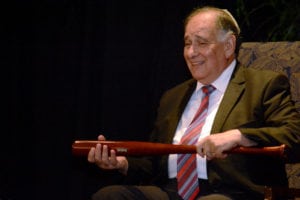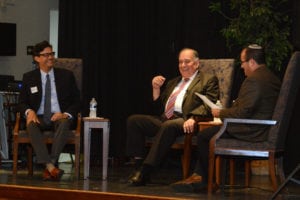
Haifa Mayor Yona Yahav shows off the Louisville Slugger Keneseth Israel presented him following his appearance there Tuesday. (photo by William Beasley)
(Editor’s note: This is a revised version of the original story.)
Yona Yahav spoke optimistically about the future of Haifa.
The mayor of Israel’s third largest city – and his hometown – for 14 years, Yahav described in glowing terms its burgeoning university life, the growth of its biotech sector and the close and peaceful contact its Jewish, Muslim and Christian residents have experienced for years.
But when it came to the future of Israel itself, Yahav, who was born in British Mandate Palestine and grew up with the country, was far less optimistic.
“I am not convinced yet that the Jews know how to run an independent nation, and that is not a joke,” he told the silent crowd.
He said that most of Israel’s growth is in the central part of the country, along Highway 1; he referred to the largest city, half jokingly, as the “state of Tel Aviv;” and he lamented that so many Israelis choose to make a life for themselves outside their own homeland.
“Go home and think about it,” he told the crowd.
It was a downbeat ending to an otherwise upbeat evening Tuesday at Keneseth Israel. The congregation hosted a forum with Yahav and Bryan Warren, director of the Office for Globalization at Louisville Forward. The topic: compassionate cities.

Yona Yahav (center) with Bryan Warren, director of globalization for Louisville Forward, and Rabbi Michael Wolk, the moderator for the program.
The mayor might not have raised the subject at all but for a final question during the Q&A portion of the program about where Haifa and Louisville will be in 10 years.
He said the Jews lost the First and Second Temples. Now, in the post-Holocaust era, “God gave us a last opportunity.”
Otherwise, the night’s discussion, moderated by Rabbi Michael Wolk of Keneseth Israel, allowed Yahav and Warren to highlight the compassionate highlights of their cities.
“Diversity [of Louisville] has been part of its DNA since its founding,” Warren said, noting that this place was the “nexus” of newcomers, the hunting ground for Native Americans, and the destination for French, Germans and Jews by the 1800s.
And in Haifa, Yahav, once a spokesman for famed Jerusalem Mayor Teddy Kollek, noted that he has kept extremist ideas out of city government whether they originated with Jews or Arabs.
“You have to be sensitive to everything happening in the city,” he said, adding, “it is very easy to cause an explosion.”
Turning to the role religion plays in making the two cities compassionate, Warren said religious organizations have contributed to the schools, health care and social services that sustained Louisville, Jewish Hospital being one example.
Yahav preferred to share stories of his upbringing including how his mother treated people and how an Arab judge his father, a truck driver, knew always treated him with respect.
Those childhood memories, he explained, inform how he behaves as mayor.
A Haifa native and lawyer, Yahav was a lieutenant colonel in the Military Police Corps. He studied law at Hebrew University and the University of London before becoming secretary-general of the World Union of Jewish Students. He served in the Knesset from 1996-99 as a member of the Labor Party before winning his first term as Haifa’s mayor in 2003 on the Shinui-Greens ticket.
Zack and Yael Melzer sponsored the program. Zack, the president of Tova Industries in Louisville and a Haifa native, said he got the idea last December while visiting his hometown and meeting the mayor at the Dan Carmel Hotel.
“He said, ‘so what have you done for this city?’” Melzer recalled. “That’s how this evening came about.”
Before long, Melzer’s sister, Haya Kovacs, president of the Rotary Club Hod HaCarmel in Haifa, got involved, turning the program into a fundraising opportunity for the club’s favorite charity, the Nirim School for at-risk children. It uses animal therapy in its curriculum.
“We can see how their confidence is built,” Kovacs, who traveled to Louisville to be at the program, said of the teens in the school.” We can see how they’re taking care of animals. They’re not afraid of animals.”
The Melzers agreed to double the donations to the school made during Tuesday’s program.



